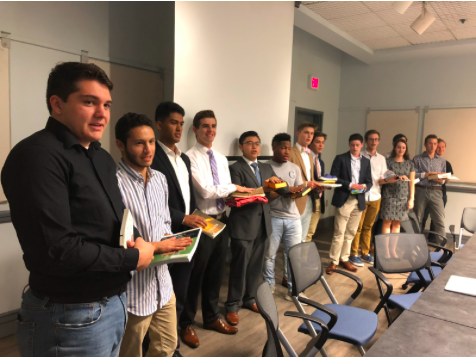Kenna Chick (SFS ’20) was confirmed as the new GUSA vice president following the swearing in of 14 new GUSA senators on Oct. 2. Eliza Lafferty (COL ’21) and Patrick Walsh (SFS ’21) were chosen as the senate speaker and vice speaker respectively.
Following her nomination, Chick gave a brief speech in which she recognized the difficulty of the last three weeks within GUSA and the student body at large.
Chick described her ability to help others through her experience as the chair of GUSA’s Mental Health team. “We are all here because we want the best for Georgetown and we want the best for the people,” Chick said.
The Senate unanimously confirmed Chick, and she took an oath of office shortly after.
In a GUSA statement from Oct. 1 announcing Chick’s nomination, GUSA President Juan Martinez (SFS ’20) emphasized her capacity to improve students’ mental well-being on campus. “She would continue to focus on mental health and student wellness, working to break down barriers so that all Hoyas can better access resources that they need. Finally, she would also work toward promoting a more survivor-centric campus culture, advocating for healthier student interactions and greater awareness,” the statement read.
Martinez is looking forward to working with Chick over the next year. “I’m very happy that the senate chose and voted for vice presidential nominee Kenna Chick,” he said. “I’m really excited to know her, work with her this year. I think she’s going to do a lot of really good things for the student body.”
Prior to Chick’s confirmation, the 14 new senators were sworn in after incumbent senators certified the election results. The new senators placed their right hand over a book of their choosing and recited the oath of office.
Lafferty and Walsh were then nominated for speaker and vice speaker and confirmed without challenge.
In a question period before their confirmation, Lafferty and Walsh said there was a need for transparency and the role of the senate in representing all students. They mentioned the open-door policy of senate meetings, plans for senators to hold office hours, and improved communications in the form of a revamped website and additional videos.
The meeting also included a presentation of statistics about election turnout and the demographic make-up of GUSA. There was 40 percent turnout for the freshman senate election, 17 percent turnout for the junior senate election, and 18 percent for the at-large senate election. The high freshmen turnout was partially attributed to the 20 candidates running for seven seats.
GUSA Election Commission Chair Minji Doh (SFS ’19) added that the procedural and logistical complaints received constituted “nothing grave, or nothing serious.”
The results of an optional survey of the current GUSA senate—not including recently resigned GUSA officials—were also presented, showing that 62 percent of the GUSA senate identified as white and 70 percent of the body identified as male.
Per the university’s Common Data Set, the undergraduate population is 54 percent white and 44 percent male.
Newly-elected Senator Julio Salmeron-Perla (SFS ‘22) stressed his responsibility as a senator to represent a diverse constituency, which he said is a challenge when only three senators of color were elected. “I will try my best as senator to represent them along with any other groups that are not represented. In my campaign, I discussed hosting town hall meetings [and more meetings, because I was told that a lot of senators were actually out of touch with the people,” Salmeron-Perla said. “To simply meet with people and to ask them: ‘What can I do for you?’; ‘What are your issues?’; ‘What are you feeling?’”
After the meeting, Martinez said rebuilding student trust is a key priority for the new administration. “We look forward to building confidence in GUSA as an institution given the events of the past,” he said. “As Vice President Chick mentioned in her speech, transparency and accountability for students, but also focusing on mental health and well-being, and encouraging healthier student practices.”





